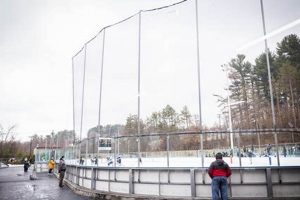Facilities in Houston offering opportunities for ice skating under the banner of a national organization provide recreational and competitive ice sports experiences. These locations typically feature ice rinks where individuals can participate in activities such as public skating sessions, figure skating lessons, and hockey leagues.
The availability of these facilities contributes to the overall health and well-being of the community by promoting physical activity and social interaction. Historically, such venues have played a role in fostering a local ice sports culture, offering training grounds for aspiring athletes and entertainment for families. The presence of a nationally recognized brand often assures a level of quality and standardized programming.
This article will delve into the specifics of the amenities, programs, and community impact associated with established ice skating venues in the Houston area. It will examine the different types of skating activities offered, the level of instruction available, and the role these venues play in the broader sporting landscape of the city.
Tips for Optimal Ice Skating Experiences
The following recommendations aim to enhance the safety, performance, and enjoyment of individuals participating in ice skating activities at facilities operating under the national organization in Houston.
Tip 1: Equipment Assessment: Prior to each session, inspect ice skates for proper fit, blade sharpness, and secure fastenings. Ill-fitting or poorly maintained skates can increase the risk of injury.
Tip 2: Protective Gear Utilization: Helmets are strongly advised, particularly for novice skaters and children. Consider wrist guards and knee pads to mitigate potential injuries from falls.
Tip 3: Warm-Up Procedures: Engage in light aerobic exercises and stretching before entering the ice surface. Adequate warm-up prepares muscles and reduces the likelihood of strains or sprains.
Tip 4: Awareness of Surroundings: Maintain a vigilant awareness of other skaters and obstacles on the ice. Avoid sudden stops or directional changes that may lead to collisions.
Tip 5: Adherence to Facility Rules: Comply with all posted rules and guidelines established by the ice rink management. These regulations are designed to ensure the safety and orderly conduct of all participants.
Tip 6: Skill-Appropriate Activities: Engage in skating maneuvers and activities that align with individual skill levels. Attempting advanced techniques without proper training can result in accidents.
Tip 7: Hydration Maintenance: Drink water regularly, especially during extended skating sessions, to prevent dehydration and maintain optimal performance.
These tips, when implemented consistently, can significantly improve the safety and enjoyment of ice skating. Prioritizing safety protocols and skill development enhances the overall experience at the venue.
The subsequent sections of this article will address the specific programs and community involvement initiatives offered by facilities in Houston, further illustrating their role in promoting ice sports and recreation.
1. Recreational Skating
Recreational skating forms a foundational element within the offerings of ice skating venues affiliated with a national organization in Houston. It represents a primary point of entry for individuals seeking casual engagement with the sport. The availability of regularly scheduled public skating sessions directly influences community participation and overall accessibility to ice-related activities. These sessions provide opportunities for families, students, and individuals of all ages to enjoy skating in a non-competitive environment. For example, weekend afternoon sessions at a Houston facility could draw hundreds of participants, introducing many to the fundamental skills of balance and movement on ice.
The economic viability of such establishments often relies on the consistent patronage of recreational skaters. Revenue generated from public skating admissions and skate rentals contributes significantly to operational costs, allowing the venue to sustain other programs such as figure skating lessons and hockey leagues. Furthermore, positive experiences during recreational sessions can serve as a catalyst for individuals to explore more structured skating activities. A child who enjoys a public skate might subsequently enroll in a learn-to-skate program, demonstrating the potential for recreational skating to serve as a pipeline for talent development and increased participation in specialized ice sports.
In summary, recreational skating is both a cornerstone of community engagement and a critical driver of revenue for ice skating venues. Understanding its role allows for better planning of public programs, optimization of facility resources, and enhancement of the overall skating experience. Without a robust recreational skating component, the broader ice sports ecosystem within a city may be significantly diminished, impacting both accessibility and the long-term sustainability of ice skating facilities.
2. Figure skating lessons
Figure skating lessons represent a core component of services offered at ice skating facilities affiliated with a national organization in Houston. These lessons provide structured instruction in fundamental skating skills, edge work, jumps, spins, and choreography. They serve as a primary pathway for individuals to progress from recreational skating to more advanced competitive levels within figure skating. The quality and availability of these lessons directly impact the development of skaters and the overall competitiveness of local figure skating clubs. For instance, a Houston-based venue may offer Learn to Skate USA programs, providing a standardized curriculum for beginner skaters that is recognized nationally. The presence of certified instructors is also critical in ensuring safe and effective training.
The provision of figure skating lessons has a cascading effect on the ice skating ecosystem. Successful programs attract more participants, leading to increased ice time rentals, skate sales, and demand for specialized coaching. Moreover, the success of local figure skaters trained at these facilities enhances the reputation of the venue and encourages further investment in training resources and infrastructure. Consider a scenario where a young skater, having begun with basic lessons at a Houston facility, advances to national competitions. This achievement not only reflects the skater’s dedication but also the quality of the instruction received at that particular venue. The prominence of the facility then rises in the skating community.
In summary, figure skating lessons are not merely an ancillary service but an integral element of ice skating facilities. Their impact extends beyond individual skill development, influencing facility revenue, community engagement, and the overall competitive landscape of figure skating in the region. The availability of quality instruction is a critical determinant of the venue’s success and its contribution to the ice skating community.
3. Hockey Leagues
Hockey leagues constitute a significant operational and programmatic aspect of ice skating facilities operating under a national banner within Houston. The existence and success of these leagues are intrinsically linked to the presence of suitable ice rinks and supportive infrastructure. These leagues are structured to cater to a wide spectrum of skill levels, ranging from beginner instructional programs for youth to highly competitive adult divisions. A facility’s capacity to host organized hockey is a determining factor in its ability to generate consistent revenue through ice rentals, equipment sales, and league registration fees. For example, a Houston-based rink may allocate specific ice slots throughout the week for various hockey leagues, ensuring a steady stream of participants and revenue. The presence of well-managed hockey programs enhances a facility’s reputation within the local sports community, attracting both players and spectators, and creating a vibrant atmosphere.
The development of hockey leagues also necessitates the availability of qualified coaches, referees, and support staff. Ice skating facilities often collaborate with local hockey organizations or governing bodies to ensure compliance with safety standards, rule enforcement, and fair play. Moreover, the facility may provide supplementary services such as equipment repair, pro shops selling hockey gear, and training programs to enhance player performance. A facility with robust hockey programs is viewed as an asset by the community, fostering physical activity, promoting team sportsmanship, and providing opportunities for social interaction. The economic impact extends beyond the facility itself, benefiting local businesses through increased patronage from players and their families.
In summary, the integration of hockey leagues into the operational framework of an ice skating venue in Houston is critical for its long-term sustainability and community engagement. The successful management of these leagues requires a commitment to safety, infrastructure development, and collaborative partnerships. Failure to support hockey programs can lead to reduced revenue, decreased community participation, and diminished relevance within the local sports landscape. Therefore, a comprehensive understanding of the relationship between ice skating facilities and hockey leagues is essential for effective management and strategic planning.
4. Equipment Rentals
Equipment rentals are a crucial operational component of ice skating facilities affiliated with a national organization within Houston. Access to rental skates and protective gear allows individuals, particularly newcomers, to engage in ice skating without incurring the significant upfront cost of purchasing their own equipment. The availability of well-maintained and properly sized skates directly affects the skater’s experience, influencing comfort, performance, and safety. For instance, a Houston venue offering a wide range of skate sizes and regular blade sharpening is better positioned to attract and retain customers compared to a facility with limited or poorly maintained equipment. The revenue generated from equipment rentals contributes substantially to the financial sustainability of the venue, supporting other programs and operational expenses.
The quality of rental equipment also influences the perceived value of the overall skating experience. If a customer receives ill-fitting or uncomfortable skates, it can detract from their enjoyment and discourage future participation. To mitigate this risk, facilities often employ staff trained to properly fit skates and provide guidance on safety precautions. Furthermore, regular maintenance and sanitization of rental equipment are essential for hygiene and customer satisfaction. Consider a scenario where a family visits a Houston rink for a recreational skate. If the rental process is efficient, the equipment is comfortable, and the staff is helpful, the family is more likely to have a positive experience and return in the future. The rental operation, therefore, serves as a first impression and can significantly impact customer loyalty.
In summary, equipment rentals are not merely a secondary service but an integral aspect of ice skating facilities associated with a national brand in Houston. Their effective management directly impacts customer satisfaction, revenue generation, and the overall accessibility of ice skating as a recreational activity. Prioritizing the quality, maintenance, and customer service associated with equipment rentals is essential for the long-term success of the facility and its contribution to the local skating community.
5. Public sessions
Public skating sessions constitute a vital component of ice skating facilities under the banner of a national organization in Houston. These sessions represent dedicated periods during which the ice rink is open to the general public for recreational skating. The accessibility and scheduling of public sessions directly affect community engagement and the overall utilization of the facility. For instance, well-advertised weekend and holiday sessions attract a broad demographic, fostering a sense of community and providing accessible recreational opportunities. The revenue generated from public skating admissions contributes significantly to the financial stability of the venue, supporting operational expenses and enabling the provision of other programs.
The success of public skating sessions often hinges on factors such as ice quality, music selection, and the presence of staff to ensure safety and enforce rink rules. A poorly maintained ice surface or inadequate supervision can deter skaters and negatively impact the reputation of the facility. Conversely, a well-managed public skating session can serve as an entry point for individuals interested in exploring other ice sports, such as figure skating or hockey. For example, a child who enjoys a public skate may subsequently enroll in learn-to-skate classes, demonstrating the session’s role as a catalyst for greater participation.
In summary, public skating sessions are fundamental to the function and viability of ice skating facilities affiliated with the national organization in Houston. Their accessibility, quality, and management directly impact community engagement, revenue generation, and the overall success of the venue. Understanding the dynamics of public skating is essential for effective facility management and strategic planning, contributing to the long-term sustainability of ice sports within the city.
6. Community events
Ice skating venues operating under a national umbrella in Houston often integrate community events as a cornerstone of their outreach and engagement strategies. These events serve as a critical mechanism for broadening the facility’s appeal beyond regular skaters and attracting diverse segments of the population. The correlation between robust community event programming and the overall success of an ice skating facility is significant. These events drive revenue, enhance the venue’s reputation, and foster a sense of community ownership. Examples of such events include holiday-themed skates, charity fundraisers, exhibitions featuring local figure skaters, and learn-to-skate introductory sessions. These initiatives provide opportunities for individuals who might not otherwise visit the facility to experience ice skating and potentially become regular patrons.
The careful planning and execution of community events directly influence their effectiveness in achieving these objectives. Strategic partnerships with local organizations, schools, and businesses can amplify the reach and impact of these initiatives. For example, a Houston facility might collaborate with a children’s hospital to host a fundraising skate, drawing media attention and generating goodwill within the community. The facility’s ability to successfully manage these events, ensuring safety, providing adequate staffing, and creating an enjoyable atmosphere, is crucial for positive outcomes. Furthermore, the use of social media and targeted marketing campaigns can effectively promote community events and maximize attendance.
In summary, community events are an indispensable component of ice skating facilities operating under a national brand. These events are not merely ancillary activities but strategic investments that contribute to the venue’s long-term sustainability, community engagement, and overall success. Understanding the interplay between community events and facility operations is essential for effective management and for realizing the full potential of ice skating venues within the Houston landscape.
Frequently Asked Questions Regarding Ice Skating Venues in Houston
The following questions address common inquiries concerning ice skating facilities operating under a national organizational structure in Houston. These answers provide clarification on operational procedures, program offerings, and general information.
Question 1: Are there multiple locations within the Houston metropolitan area affiliated with this national organization?
The number of affiliated locations may vary. It is advisable to consult the organization’s official website or directory to verify the current list of participating facilities in the Houston region.
Question 2: What are the standard operating hours for public skating sessions at these venues?
Operating hours are subject to change based on seasonal demand, special events, and facility maintenance schedules. Contacting the specific venue directly or checking its online calendar is recommended for accurate session times.
Question 3: Is prior ice skating experience required to participate in public skating sessions?
No prior experience is typically required. Public skating sessions are open to individuals of all skill levels, including beginners. However, instruction is generally not provided during these sessions.
Question 4: Are rental skates available at the Houston-area facilities?
Yes, rental skates are generally available. Sizes and availability may vary; it is advisable to inquire about specific sizing needs prior to arrival.
Question 5: What safety measures are in place at these ice skating venues?
Safety measures commonly include rink-side staff, posted rules and guidelines, and the availability of first-aid equipment. Patrons are encouraged to wear appropriate protective gear, such as helmets, particularly for novice skaters.
Question 6: Are figure skating and hockey lessons offered at these facilities, and how can one enroll?
Many affiliated venues offer figure skating and hockey programs. Enrollment procedures and program details are typically available on the facility’s website or by contacting the skating director or program coordinator directly.
These answers provide a general overview of common questions. Specific inquiries should be directed to the respective ice skating venue for the most accurate and up-to-date information.
The following section will address the economic impact of these venues on the local Houston community.
Conclusion
The preceding analysis elucidates the multifaceted role of facilities affiliated with the national organization within Houston. These venues contribute to recreational opportunities, athletic development, and community engagement, providing access to ice skating for a diverse population. Their operational effectiveness, program offerings, and community involvement directly impact their sustainability and relevance within the Houston metropolitan area. The range of activities, from public sessions to organized leagues and specialized instruction, illustrates the comprehensive nature of these establishments.
Continued support and strategic planning are essential to maximize the benefits derived from these resources. Investment in infrastructure, program development, and community outreach will ensure their continued contribution to the city’s recreational landscape. The long-term vitality of Houston’s ice skating community depends on recognizing and fostering the crucial role played by venues operating under the national organizational structure, solidifying their place in the city’s cultural and sporting fabric.




![Find the Perfect Ice Skates for Women | [Brand] Learn to Surf & Skate: A Beginner's Step-by-Step Guide Find the Perfect Ice Skates for Women | [Brand] | Learn to Surf & Skate: A Beginner's Step-by-Step Guide](https://universitysurfandskate.com/wp-content/uploads/2026/01/th-835-300x200.jpg)


